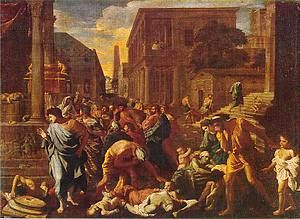 By Fr. Patrick Henry Reardon
By Fr. Patrick Henry Reardon
For years, I used this outstanding article for inquirers who wonder about the importance of worship in the Christian faith. I lost it for awhile, but in my recent move, I found my only remaining copy of it – maybe the only remaining copy anywhere (I contacted Fr. Patrick some time ago asking for another copy, but he had lost it along with many other writings as a result of a computer crash). I will be using it again, and I encourage you to do so as well. Fr. Patrick, in his succinct and typically charming manner, shows us just what happens when you invent your own worship.
“We have seen the True Light,”
we sing each Sunday in the Orthodox Church. At the very least, this means that we don’t have to guess about God anymore. We know Him as he is revealed to us in the Son and in the Holy Spirit. This definitive revelation of the Living God is, just to start with, supposed to ‘take the guesswork’ out of religion.
Without this revelation, there certainly is a great deal of guessing in religion, a lot of going with hunches, a considerable amount of hit and miss, with no end of hedging one’s bets. Left to their own religious devices, men must ‘wing it.’ They are obliged to ‘give it their best shot,’ which is usually just a shot in the dark. Apart from the “True Light” human beings are forced to make it up as they go along.
For example, the Iliad begins with the story of how the wrath of Apollo sends a plague on the Greeks besieging Troy. They don’t know exactly how they have offended Apollo or what they should do about it. In fact, the god is upset with them because they had kidnapped the daughter of one of his priests. When the Greeks do manage to figure out what the problem is, they have to devise some way of dealing with it. Well, they do finally work it out, but then their real trouble starts, which is the rest of the Iliad.
God being merciful, the religious guesswork is occasionally successful. One of my favorite examples of this is from the Bible. First Samuel 5 describes how the Philistines (who, by the way, were blood relatives of the people in the Iliad) captured the Ark of the Covenant from the Israelites.
Like the Greeks who snatched the daughter of Apollo’s priest, the Philistines are standing around congratulating themselves on a great steal, but genuine trouble is about to start. They have gotten hold of more than they can handle, and some historians believe that 1 Samuel 5 is the world’s oldest description of bubonic plague. Maybe so. It is certainly a plague of some sort, signifying that they have somehow gotten on the wrong side of ‘somebody upstairs.’
The Bible goes on to describe, on one of its funniest pages, how they deal with the problem. They just first give back the Ark, just as the Greeks had to give back the girl to her father. But how do you go about giving back an Ark? Just what is the protocol?
 Well, they noticed during the plague the rather large number of mice that were running around at the time. Philistine medicine was not advanced to the state of knowing that fleas and ticks, living in the fur of rodents, carry the disease. No, they only observed that there was an uncommon number of mice around during the plague, and they surmised that the two things could be related. So, hey, give it a shot. Make some little golden mice and put them in the Ark of the Covenant. Who knows? It might work.
Well, they noticed during the plague the rather large number of mice that were running around at the time. Philistine medicine was not advanced to the state of knowing that fleas and ticks, living in the fur of rodents, carry the disease. No, they only observed that there was an uncommon number of mice around during the plague, and they surmised that the two things could be related. So, hey, give it a shot. Make some little golden mice and put them in the Ark of the Covenant. Who knows? It might work.
The Philistines also observed something else. They got boils of some kind on their bodies during the plague. The King James Version translates the word as hemorrhoids ‘in their secret parts’ which would certainly go a long way, I submit, to explaining verse 66 in the Greek version of Psalm 77 (78):
“He hit His enemies in the rear.”
Somehow this interpretation has always appealed to me.
So, what do they do, these Philistines who are making up their religion as they go along? That’s right. They make little golden hemorrhoids and put them in the Ark of the Covenant.
You see, it finally comes down to something like this. If you’re really on your own in religion, if you have no choice but to make it up as you go along, you end up (so to speak) offering Almighty God little golden images of your hemorrhoids.
What a commentary on man-made religion.